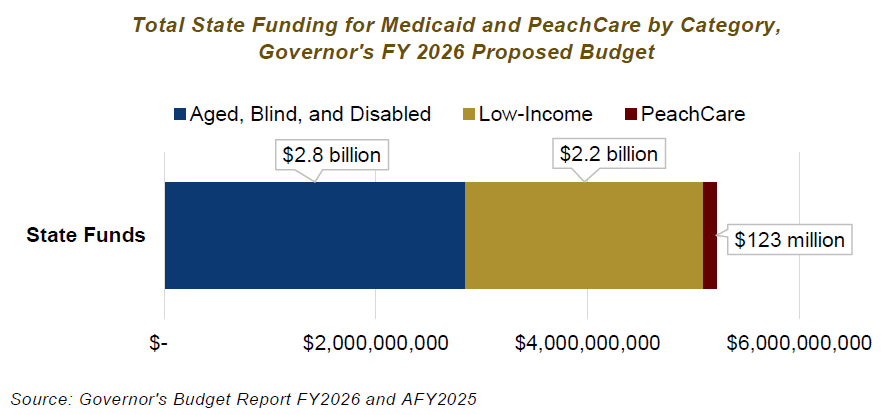Introduction
The Department of Community Health administers the state’s healthcare safety net, reimburses hospitals for services provided to uninsured and underinsured Georgians, manages health insurance coverage for state and school system employees and regulates health care and long-term care facilities. Governor Kemp’s budget proposal for Fiscal Year (FY) 2026 provides the Department with $5.5 billion in state funds. That includes about $4.8 billion in state general funds, $464 million in hospital provider payments, $158.9 million in nursing home provider fees, $124 million in tobacco settlement funds and $8.8 million in ambulance provider fees. Governor Kemp’s budget proposal increases the Department’s state funding by $274 million, or 5%, above the FY 2025 budget. Much of the state funding increase is accounted for by projected growth in Medicaid utilization.
About 94% of the Department’s proposed funding is earmarked for Medicaid and PeachCare, which provide healthcare coverage to over 2 million Georgians with lower incomes. About 71 percent of total Medicaid and PeachCare enrollees are children under the age of 19.[1] Most of those children are included in the Low-Income Medicaid category and a small proportion whose parents’ incomes are above the Medicaid threshold are enrolled in PeachCare. Although most Medicaid and PeachCare enrollees are children, more than half (55%) of proposed FY 2026 state funds for Medicaid and PeachCare would support coverage for older adults and individuals with disabilities.

Budget Highlights
Amended Fiscal Year 2025 Budget
- $50 million increase to replace and/or expand buildings at the Mercer and Morehouse Schools of Medicine
-
$11.5 million increase to fund new, high-cost drugs
- In exchange for preferred pricing under the Medicaid Drug Rebate Program, state Medicaid programs must generally cover all covered drugs approved by the federal Food and Drug Administration (FDA). In December 2023, the FDA approved two new therapies for the treatment of sickle cell disease, which in part accounts for this increase[2]
-
$6.3 million increase to implement 12 months of Medicaid and PeachCare eligibility for children under the age of 19
- Effective January 2024, all states are required to provide 12 months of continuous eligibility for children under the age of 19. Data shows that continuous eligibility and consistent access to health care improve health and well-being. Continuous eligibility also reduces the state’s administrative costs associated with enrollees cycling on and off coverage due to temporary income fluctuations among families with low-incomes[3]
-
$795,000 increase to support the Program for All-Inclusive Care for the Elderly (PACE)
- This program provides medical and social services for older adults and enables them to remain in the community rather than receiving care at a nursing home[4]
Fiscal Year 2026 Budget
- $36.6 million increase to fund new, high-cost drugs
- $22.8 million increase to implement 12 months of Medicaid and PeachCare eligibility for children under the age of 19
- $1.5 million increase to add 75 new residency slots in primary care medicine
- $1 million increase to support the Program for All-Inclusive Care for the Elderly (PACE)
Proposed Federal Medicaid Cuts Would Threaten State Budget
Medicaid is jointly financed by the state and the federal government and is administered by the state. Currently, the federal government pays about 66% of health care costs for Medicaid enrollees in Georgia, and the state pays the remainder. Medicaid is Georgia’s largest source of federal revenue. Federal Medicaid dollars alone (without accounting for state Medicaid spending) comprised 20% of the state’s total budget in FY 2023.

Congress is considering proposals that would drastically cut federal spending on Medicaid, such as instituting per capita caps or reducing the regular Medicaid matching rate.[5] Most of these proposals would fundamentally change Medicaid’s funding structure. The severe decrease in federal Medicaid funding would result in financial risk for the state.[6] Shifting costs to the state would force the state to make difficult decisions around cutting eligibility and benefits for Georgians who make low-incomes. It would also threaten the financial viability of Georgia’s hospitals, particularly hospitals that primarily serve children or hospitals in rural communities that have already felt the pressure of hospital closures over the past decade.[7],[8] Protecting against Medicaid cuts is critical for the health of Georgia’s economy and the well-being of Georgia’s low-income families.
Endnotes
[1] GBPI analysis of October 2024 state Medicaid enrollment data from data.medicaid.gov
[2] Stein, R. (2023, December 8). FDA approves first gene-editing treatment for human illness. NPR. https://www.npr.org/sections/health-shots/2023/12/08/1217123089/fda-approves-first-gene-editing-treatments-for-human-illness
[3] Brooks, T. & Gardner A. (2021, July). Continuous coverage in Medicaid and CHIP. Georgetown University Center for Children and Families. https://ccf.georgetown.edu/wp-content/uploads/2012/03/CE-program-snapshot.pdf
[4] Centers for Medicare and Medicaid Services. (n.d.) Program of All-Inclusive Care for the Elderly. Medicaid.gov. https://www.medicaid.gov/medicaid/long-term-services-supports/program-all-inclusive-care-elderly/index.html
[5] Park, E. (2025, January 20). House budget committee circulates new detailed list of budget reconciliation options. Georgetown University Center for Children and Families. https://ccf.georgetown.edu/2025/01/20/house-budget-committee-circulates-new-detailed-list-of-budget-reconciliation-options-including-draconian-medicaid-cuts-within-house-republican-caucus/
[6] Lukens, G. & Zhang, E. (2025, January 7). Medicaid per capita cap would harm millions of people by forcing deep cuts and shifting costs to states. Center on Budget and Policy Priorities. https://www.cbpp.org/research/health/medicaid-per-capita-cap-would-harm-millions-of-people-by-forcing-deep-cuts-and
[7] Harker, L. (2017, June 22). Gutting federal health law imperils Georgia families, hospitals, state budget. Georgia Budget & Policy Institute. https://gbpi.org/gutting-federal-health-law-imperils-ga-families-hospitals-state-budget/
[8] Chan, L. The State of Georgia’s Healthcare System. Georgia Budget & Policy Institute. https://gbpi.org/wp-content/uploads/2024/03/statemap-final.pdf









